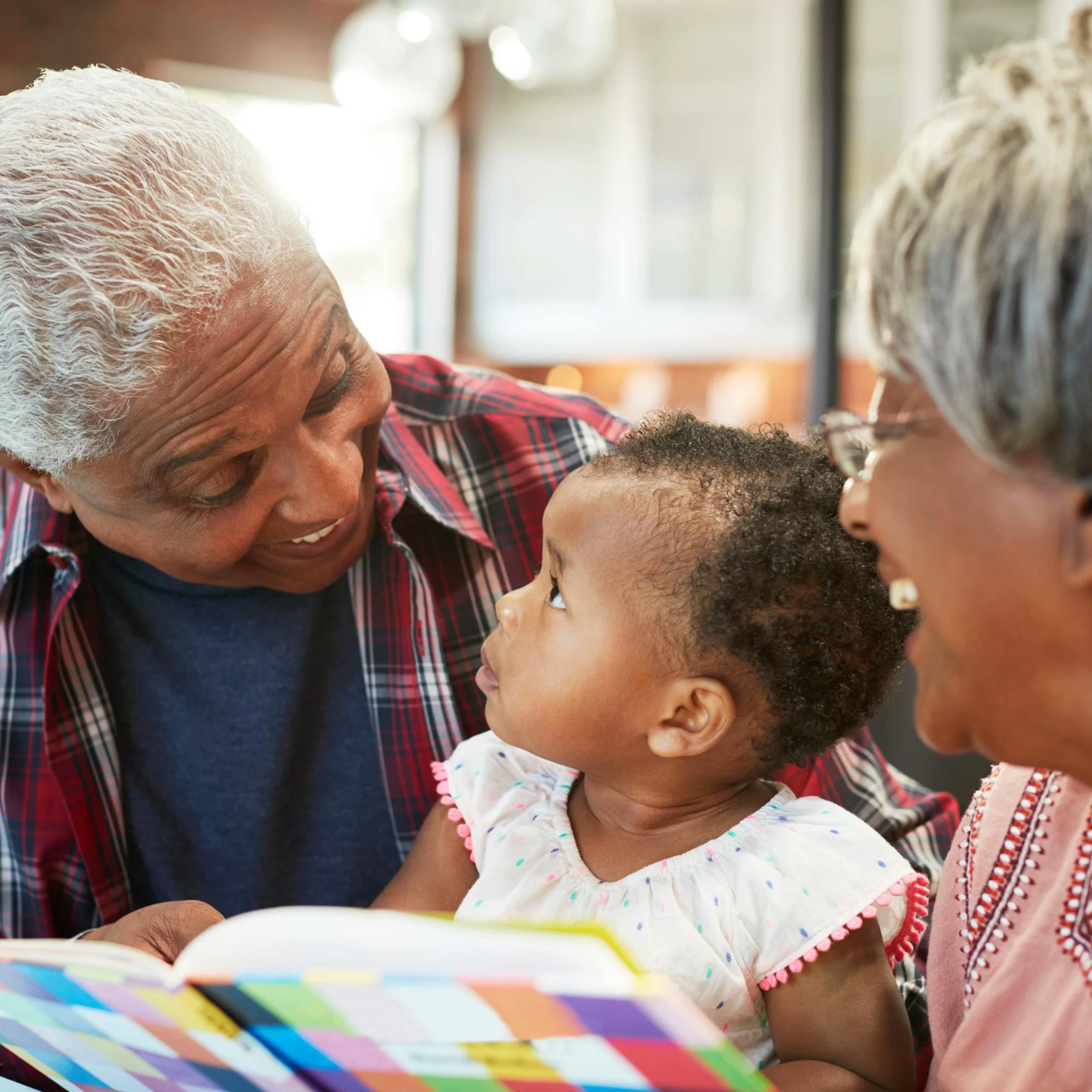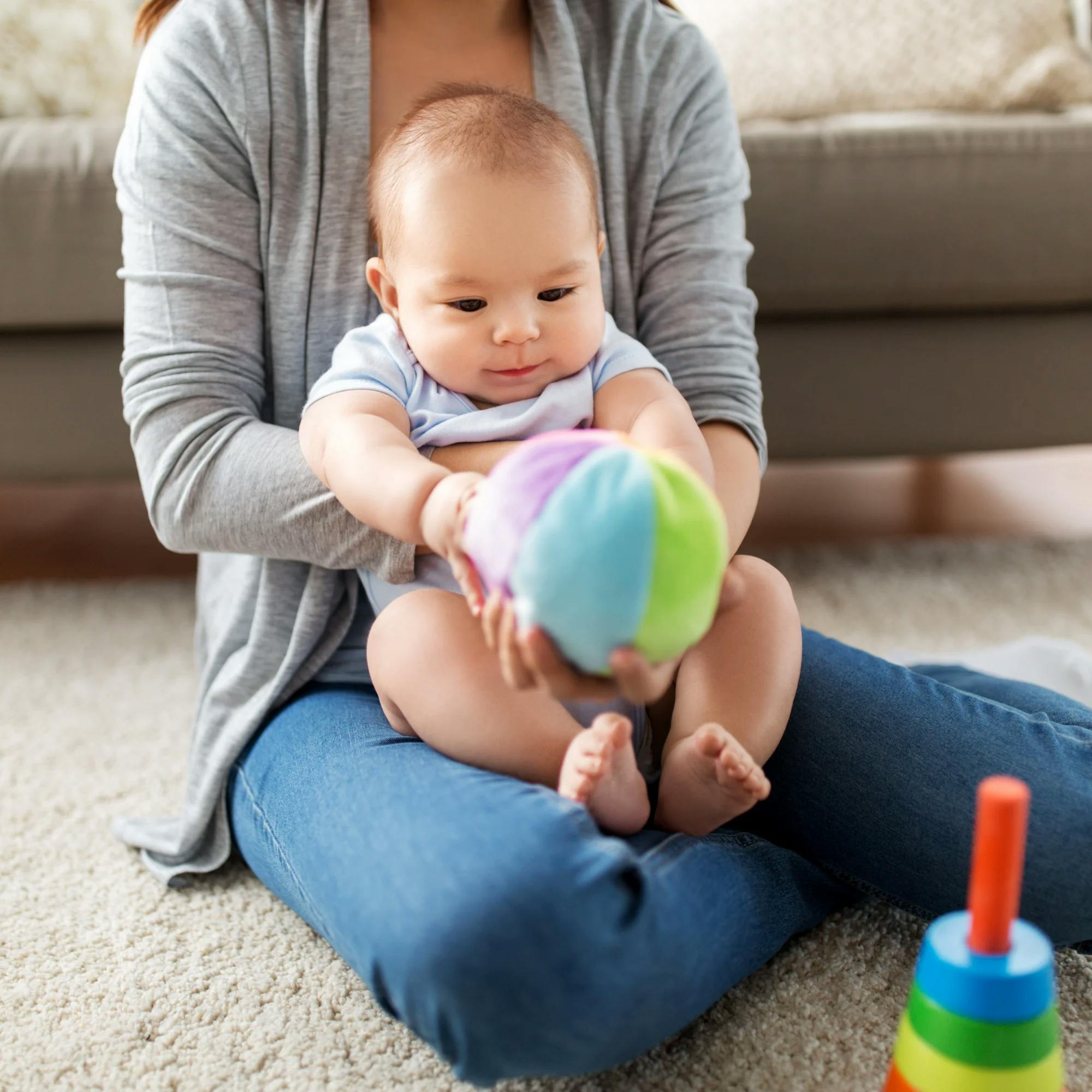
Speech and Language Milestones for Infants (0-12 Months)
 Abby Barnes, M.S., CCC-SLP
Abby Barnes, M.S., CCC-SLP
Speech and language development begins long before a baby’s first words are ever spoken. From the moment a child is born, there are many nonverbal communication milestones, like babbling or even a smile, that are good indicators of how they're progressing. That's why it's so important for parents and caregivers to observe and monitor these signs of typical development.
Some of these speech milestones are more obvious than others. This article covers what you need to know and look for in your baby's first year of life.
Is your child on track?
Take our free screener to learn more about your child's development and whether a speech evaluation is recommended.
 Screener for children
Screener for children0- to 3-month-old infants
As soon as babies are born, they are absorbing the environment around them. Sight, sound, touch, taste, and smell--it's a whole new sensory world!
Response to sound: When it comes to speech and language development, response to sound is one area to closely observe. Babies that are 0 to 3 months old should consistently startle or react to loud sounds. If your baby is not doing this, a hearing assessment should be performed (make sure to speak with your pediatrician).
Calming in response to voice: Another skill your baby should exhibit is the ability to quiet or calm in response to a familiar voice. Each time your baby quiets down around you, you should feel extra proud--not only did you calm your baby, but they are actually learning basic skills needed for language development!


Cooing: Those sweet, early cooing sounds your child has started to make are also a major part of language growth. Babies learn how to use their voice early on, so encourage vocal play. Talk and sing to them in response to what they are “saying” to you.
Crying: Less pleasant than the cooing, but still just as important, is crying. Babies cry to express their needs. During this 0-3 month stage, you may even notice your child’s cries sounds slightly different for different needs (hunger, diaper changes, tiredness, etc.)
Smiling: This 0- to 3-month stage is the time when the first smile should occur. This simple action is actually a big sign that language development is on track. Not to mention, it’s a pretty special moment for parents and caregivers, as well!


3- to 6-month-old infants
Music awareness: During this stage, you may notice your baby becoming more attentive to music. This is a skill that links to hearing and comprehension abilities.
Following eyes: An infant in this age group should also begin to shift their eyes and turn their head in response to a sound. This begins to demonstrate their awareness to their environment.
Toys: A 3- to 6-month-old infant should also begin to mouth toys and show interest in toys with sound. These are some of the most early signs of play, and play is highly correlated to speech and language development.
Voice experimentation: Your baby should also begin experimenting with their voice. Lots of squeals and variation of pitch happen at this time. Encourage your baby to make sounds by vocalizing back to them. You should also begin to hear some simple babbling sounds, like “ma” or “ba.”
Laughing: Another highly anticipated skill you may observe is your baby’s first laugh. Nothing is sweeter than this! Laughing and giggling demonstrates that babies are engaged with other people and their environment. It is a simple and early way your baby can signal that they're enjoying whatever is happening. Some babies develop this skill around the 3- to 4-month mark. If you haven’t heard your infant laugh by 6 months, be sure to bring this up at your next pediatrician visit.


6- to 9-month-old infants
Shaking objects: Your baby should also begin shaking and banging objects and toys during play. They don’t quite have the cognitive or physical abilities to play with toys appropriately yet, but they are getting closer.
Waving: Another exciting milestone in this age range is the first time your child waves “bye-bye.” They will likely do this after being prompted to wave “bye-bye,” hearing the word “bye-bye,” or after seeing somebody model a wave.
Longer babbling: In this stage, you should begin hearing your baby produce more reduplicated babbles. So instead of just saying, “ma,” your baby will begin saying, “mama,” or “mamama.” These babbles may sound like words, but likely do not have meaning associated quite yet. The first meaningful word happens a little later on in the first year (or soon after).

9- to 12-month-old infants
Play and games: This stage is when you really begin seeing the personality of your baby. This is evidenced by more engagement in simple play. Your baby will likely begin to react to fun games like “peek-a-boo.” You should also begin to see your child anticipating what will happen next in simple games. Here’s an example: If you reach your arms out to tickle your baby, you may see their face scrunch up or they may turn away. They may even let out a giggle before you even touch them! This demonstrates that your baby has begun to demonstrate anticipation.
Joint attention: One of the biggest skills that should develop in this age range is joint attention. This is when two people are engaged and focusing on the same task or object. You may see your baby look at a toy you present, and then look at you. This is joint attention! It’s almost as if they are trying to say, “This toy is so cool! I see it, do you see it?” Joint attention is the very basis of communication, and is an incredibly important milestone your child should be reaching. Babies typically begin demonstrating joint attention around 9 months of age.


Responding to their name: Close to or shortly after your child's 1st birthday, you should notice that they begin responding to their own name. This is a big milestone! In addition, they should respond even if their attention is already focused on something else. These responses should happen regularly, not just once in awhile. Consistently responding shows your baby has a good grasp of this skill.
Sound imitation: This 9-12 month stage is a time of huge verbal growth. Your baby should begin imitating simple, non-speech sounds like “Vroom! Vroom!” for a car, or “Nay!” for a horse.
Meaningful words: The “Mama” and “Dada” babbles you have been hearing for a while will begin to take on meaning. In the 9-12 month stage, it is likely that your child will begin to use simple babbles like these purposefully. The first word typically happens somewhere around the 1 year mark. However, it could be a little earlier or later.
Imitation: Your child’s imitation skills should begin to increase as a whole at this stage. Your child may begin trying to imitate more words, or even imitate your facial expressions, which is fun for parents to watch!


All of these skills are vital to ensure your child's speech and language development is progressing appropriately.
If your child does not appear to be meeting the age-expected milestones mentioned above, it's important to speak with a pediatrician or speech-language pathologist. You may begin to observe your child becoming frustrated that they're unable to communicate their basic wants and needs.
How Expressable Can Help
Concerned your child isn't reaching age-expected milestones? Looking for communication support from a professional? Expressable is a national online speech therapy practice serving children and adults. We treat all major areas of communication and feeding, offer flexible hours including evenings and weekends, and accept most major health insurance plans. We’re proud to have earned more than 3,000 5-star reviews from our clients (4.9/5 average).
Our therapy model is centered on parent and caregiver involvement. Research proves that empowering caregivers to participate in their loved one’s therapy leads to better outcomes. That’s why we combine live, 1-on-1 speech therapy with personalized education and home practice activities for faster progress.
Communication is more than words. It’s how we share how we feel and show who we are. We’re here to help you or your child do just that.












